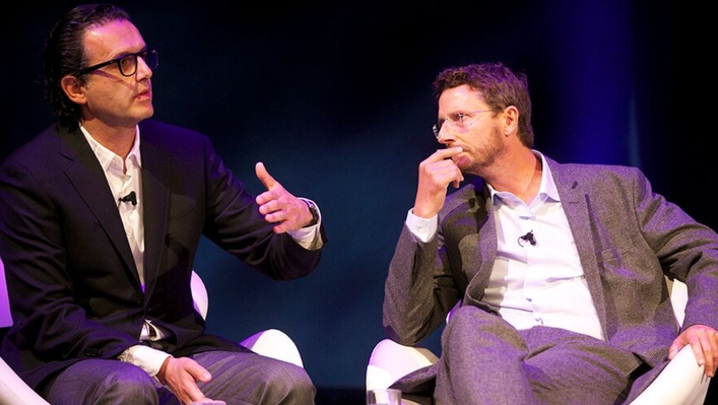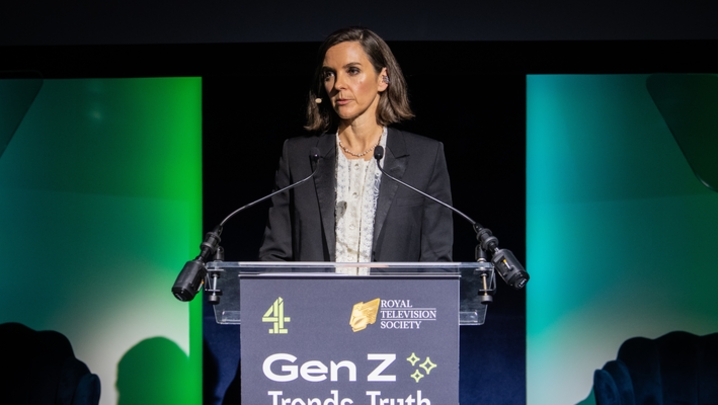The Government rules nothing out as the network’s future exercises minds in Whitehall and Hollywood. Maggie Brown goes behind the scenes
When Ofcom holds its final board meeting of 2015 in December, it will have a list of the candidates competing to be the next Chair of Channel 4. At the top of the list will be Mark Price, outgoing Chief Executive of Waitrose and Deputy Chair of John Lewis.
The advert for the post – a hugely sensitive one, as the Government explores the possibility of selling off Channel 4 – was hurried out on 10 October by favoured headhunter Dom Loehnis of Egon Zehnder, with a closing date of 16 November.
A key requirement for the job was: “having regard to the debate around the future of the channel and of public service broadcasting’s contribution to the creative industries”.
One worldly observer says: “The exam question to pass is, ‘Do you support a for-profit Channel 4 model?’” This is seen as the key to the broadcaster being realistically valued.
The appointment will be of acute interest to US media companies circling UK media assets. Claire Enders, Chief Executive of Enders Analysis, confirms: “We have been approached by banks seeking to understand what changes can be made to have a more attractive remit for Channel 4.”
On 4 November, at Prime Minister’s Questions, David Cameron admitted that “all the options” were being considered for Channel 4, fuelling concerns that a sale is being discussed at Cabinet level.
This came after the SNP’s culture spokesman, John Nicolson, a former BBC and ITV news journalist, now the MP for East Dunbartonshire, asked: “Can the Prime Minister confirm… that no discussions are under way to privatise and imperil this much-loved and important public institution?”
Cameron replied: “I want to make sure that Channel 4 has a strong and secure future and I think it is right to look at all the options, including to see whether private investment into Channel 4 could help safeguard it for the future. Let’s have a look at all the options, not close our minds like some on the Opposition front bench, who think private is bad and public is good.”
The backdrop to selecting a successor to Lord Burns as Channel 4 Chair is the shock that the channel – and the entire UK broadcasting sector – received in late September. An official on his way into Downing Street was snapped holding a document, headed “Assessment of Channel 4 Corporation reform options”, by a vigilant press photographer.
Channel 4's attack on its suppliers has been relentless. It is reaping a bit of what it has sown.
The document was written by a senior DCMS figure and made clear that, behind the scenes, Secretary of State John Whittingdale and Cabinet Office minister Matt Hancock had started work to explore selling Channel 4 to the private sector.
The photographed document noted the agreement that “work should proceed to examine the options for extracting greater financial value from the Channel 4 Corporation, focusing on privatisation options in particular, while protecting its ability to deliver against its remit”.
It confirmed that the Shareholder Executive, the body that holds state assets under the wing of the Treasury, would seek permission to access the accounts of Channel 4 to “enable more meaningful options analysis”. To be fair, the options include doing nothing.
On that list is Burns’s proposal that Channel 4 should be converted from a statutory corporation into a not-for-profit, public-service trust. Under this model, stakeholders, including the independent sector, would guarantee its special remit.
The not-for-profit company shares would be held by a revolving body of 20-50 members, drawn from staff, viewers and other stakeholders.
Channel 4’s Board “put through” the option devised by Burns after May’s general election. A paper was personally handed to Whittingdale by Burns in early September.
One Conservative peer, however, believes the “not-for-profit” option is simply not a runner: “It is a political ploy to keep the Government away and it is a big mistake. It takes the competitive tension away, encourages slackness, the public sector pumping money into something for no return.”
Enders adds: “I don’t know why they did it, it had no positive impact. It was laughable.”
A source close to the situation adds: “The Treasury gets nothing. It is not going to happen.” Nevertheless, it will be considered as an option, as part of the DCMS review.
The unintended disclosure of options for altering Channel 4’s status is considered a cock-up by all concerned, including the DCMS. Enders says: “[The Chancellor] doesn’t want the whole creative economy jumping up and down. It is a profound embarrassment to the Government.” It gave the impression that preparations for a potentially radical change to Channel 4, created by Margaret Thatcher’s first Government, were under way. And all without parliamentary debate.
This point was taken up by the Culture, Media and Sport Committee, which grilled Burns and Channel 4 CEO David Abraham last month.
Revealing that a fundamental review of Channel 4’s status is high on the Government’s broadcasting agenda also blew Whittingdale’s cover.
At the Edinburgh International Television Festival in August, he sought to reassure delegates that privatisation “is not on our agenda”. But he also added that Channel 4’s remit “has nothing to do with ownership”.
The context is that a Conservative House of Commons majority has given Chancellor George Osborne carte blanche to return to his original plans for broadcasting, formulated before May 2010, when the Tories were forced to form a coalition with the Lib Dems.
The problem is that Channel 4 isn’t doing enough public service broadcasting to make a difference.
The Government is aware, however, that Channel 4 has wide, cross-party support and that any change to its statutory position might be difficult to get through the House of Lords.
Enders sees the Chancellor’s “imperial fist coming to smash through public service broadcasting”. Osborne has already created another big hole in the BBC’s finances; it has to take responsibility for covering the cost of free TV licences for the over-75s, a demand blocked in 2010 by the Lib Dems.
Ofcom has received a second, and connected, demand from Whittingdale: to revisit the terms of trade, the code governing the supply deal between qualifying independent producers and public service broadcasters (see box on page 12). If revised, this could make Channel 4 more attractive to potential bidders, especially if the broadcaster is allowed to own valuable rights currently in the hands of producers.
But this move has cost Channel 4 the wholehearted support of the producers’ organisation, Pact, which reckons that the broadcaster’s complaints about big independents being too powerful stimulated this review.
Enders, moreover, believes that this latest examination of the terms of trade is part of a long-term attempt to dismantle preferential treatment for independents – a preference ascribed to both Osborne and Sajid Javid, the former media minister, now Secretary of State for Business, Innovation and Skills.
Pact CEO John McVay is withering about Channel 4: “The attack on its suppliers has been relentless. It is reaping a bit of what it has sown.”
He is infuriated by any suggestion that benefits to larger independents should be curtailed: “Why try and act like a nanny? The degree of Victorian hubris is gobsmacking.”
The independent sector heard about the not-for-profit-trust proposal only after Burns went public. “The whole Channel 4 approach is incoherent,” fumes McVay.
Alex Graham, whose Wall to Wall company grew into a leading independent and is now owned by Warner Bros, sees “privatisation as a solution to a problem that doesn’t exist. No one has explained why it would be a good thing for viewers or broadcasting.”
Former Channel 4 CEO Michael Jackson says: “What matters, perforce, is a different remit and purpose. It wouldn’t be the same [after privatisation]. The demands of shareholders would bring a certain scepticism to it.”
Another leading TV executive argues: “The problem is that Channel 4 isn’t doing enough public service broadcasting to make a difference. There isn’t the passion for it.”
But Ron Jones, Executive Chair of Tinopolis, one of the largest independents, takes a more nuanced view: “Don’t we live in uncertain times? So many good things could be damaged. I am not, in principle, opposed to a sale as long as it is seen in a broader context, safeguarding the public purposes of broadcasting across the UK.
“A modern market economy is a balance between an entrepreneurial, piratical approach and what the public will tolerate. But, in this case, not getting it right affects how society works. It is that serious.”
Jones adds: “I’d hate to see a discussion on ownership [of Channel 4] take us away from its public-service remit. That is the biggest threat. If they do sell Channel 4, then the public purpose and reinforcement of that PSB element is most important and is desperately needed.”
One of his worries is that Channel 4, “owned by an overseas broadcaster, would be a dumping ground for its product”.
Meanwhile, Jackson’s advice to the channel is pragmatic: “Copy the BBC. Stress what more you can do as a PSB and make a creative argument.”
Why the terms of trade are under review – again
Culture secretary John Whittingdale ordered Ofcom in September to undertake a fresh review of the 2003 agreement. He sees the terms of trade as a key determinant of the shape of public service broadcasting, together with the BBC Charter and licence-fee settlement, Channel 4’s future, and the effects of rapid consolidation and ownership changes.
Channel 4 is arguing for adjustments, not abolition or wholesale change, to make the terms ‘fit for purpose’. The broadcaster does not want a one-size-fits-all model. This opens up the possibility of different terms for the BBC and Channel 4.
‘Can we have a fairer deal, a reset’ [to help sustain Channel 4 in future], asked CEO David Abraham, when he appeared before the Culture, Media and Sport Committee in October.
He pointed out that an independent’s IP was acquired when that producer was bought by a foreign company. Although new deals might not benefit from the terms of trade, all of the producer’s back catalogue and rights were covered in perpetuity.
Some variation was needed to support smaller companies, as was a clearer delineation of non-qualifying production companies, he argued.
The broadcaster suggests a cut-off point should be reached when an independent’s annual turnover reached £50m or £100m, say.
‘The last thing we want to do is anything that weakens the [independent] sector,’ Abraham said.
The DCMS has been surprised at the vehement reaction of the independent sector to its decision to review the terms of trade.







